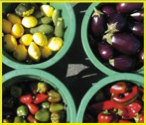
This is an introduction to the organic cultivation techniques as taught by the Rodale Institute, one of the world's foremost expositors of the feasibility of organic, sustainable agriculture.
The Rodale way reduces costs, safeguards our food and water, and builds the soil by using crop rotation, cover crops, and composting, instead of employing chemical inputs.
For decades, conventional farmers have relied on cultivating limited crop varieties and on using expensive synthetic fertilizers, pesticides, herbicides and fungicides. As a result, the nutrient rich top soil has been eroded, while the costs of these inputs have led many farmers to abandon land owned by their families for generations. Meanwhile, the toxic chemicals have poisoned both farmers and consumers who eat the food.
The Rodale way of farming builds the soil with crop rotation, cover crops, and composting.
Over 30 years, monitored by the United States Department of Agriculture and major universities, the Rodale Institute has conducted a landmark project in which conventional and organic acres of corn have been grown side by side. The organic plots have obtained equivalent yields, and in drought years have outperformed the conventional plots, while avoiding the high costs of using chemicals.
Now, producing dozens of organic grains, vegetables, and fruits on its 300 acre farm, the Rodale Institute conducts research to provide alternatives to the use of chemicals, and it conducts trainings for family farmers in exemplary alternative practices.
This film allows you to witness these techniques, led on your tour by

Jeff Moyer, Director of Farm Operations for the Rodale Institute, who in 2009 was named the Chair of the U.S. Department of Agriculture National Organic Standards Board, which provides “guidance on developing standards for substances and practices to be used in certified organic production, handling and processing" for our country.
For hard pressed family farmers — and for all concerned with producing and consuming healthy food without chemicals, with preseving our soil, and with maintaining waterways free of chemical runoffs -- organic and sustainable agriculture provides a solution.




